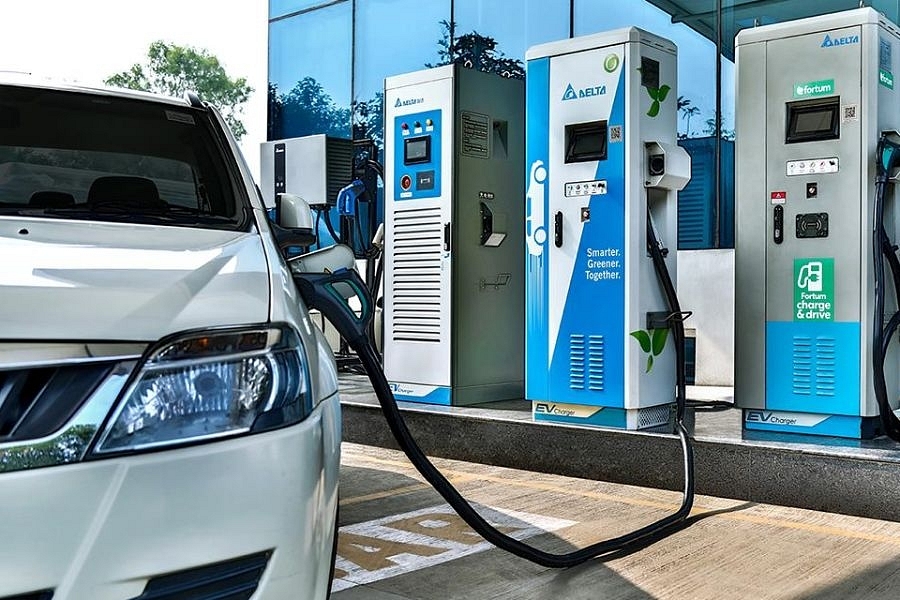Infrastructure
Tripura Becomes 15th State To Adopt An Electric Vehicle Policy
- Several states have rolled out their respective electric vehicle policy to accelerate the pace of EV adoption across vehicle segments.
- Tripura is the third state in the northeast region after Assam and Meghalaya to adopt the EV policy.

India's EV Infra (PC: Delta Electronics India)
In an effort to increase electric-based mobility, which would cut down on environmental pollution and help promote eco-friendly tourism in the state, Tripura has adopted the Tripura Electric Vehicle Policy 2022.
Tripura, thus, becomes the fifteenth state in the country to have an electric vehicles (EV) policy. The EV policy already exists in 14 states of the country. Tripura is the third state in the northeast region after Assam and Meghalaya to adopt the EV policy.
What is an EV Policy?
Several states have rolled out their respective electric vehicle policy to accelerate the pace of EV adoption across vehicle segments, especially in the mass category of two-wheelers, public/shared transport vehicles and goods carriers.
The EV policies include financial incentives (Purchase incentives, Scrapping incentives, Interest subvention on loans), exemption from road tax, vehicle registration fees. The policy also seeks to put in place measures to support the creation of jobs in driving, selling, financing, servicing and charging electric vehicles.
Last but not least, the policies deal with establishment of charging stations and swappable battery stations and setting up of recycling ecosystem for batteries.
Which States have adopted the EV policy?
As many as 15 states have notified dedicated policies to promote the adoption of EVs, giving a clear message of EV promotion from policy perspectives.
Known as the IT capital and startup capital of the country, Karnataka is the first Indian state to roll out an Electric Vehicle Policy in 2017. The other states include Andhra Pradesh, Assam, Gujarat, Karnataka, Kerala, Madhya Pradesh, Maharashtra, Meghalaya, Odisha, Tamil Nadu, Telangana, Tripura, Uttar Pradesh, Uttarakhand and West Bengal.
A look at the timeline of when states have adopted their EV policy:
Bihar, Haryana, Punjab and Rajasthan are among the states with drafted EV policies that are yet to be notified.
Why the need for state-specific policy?
In 2013, the Government of India launched the National Electric Mobility Mission Plan (NEMMP) 2020, which is a National Mission document providing the vision and the roadmap for the faster adoption of EVs and their manufacturing in the country. This plan was designed to enhance national fuel security, provide affordable and environmentally friendly transportation, and enable the Indian automotive industry to achieve global manufacturing leadership.
Under the mission plan, the Scheme for Faster Adoption and Manufacturing of (Hybrid) Electric Vehicles in India (FAME India) was launched in March 2015 to promote the adoption of electric/hybrid vehicles (xEVs) in India.
Phase 1 of the scheme was available up to 31 March 2019 with budget outlay of Rs 895 crore. This phase of FAME India Scheme had four focus areas i.e. technological development, demand generation, pilot project and charging infrastructure components.
As per review of the Phase-I, the government notified Phase-II of FAME India Scheme for a period of five years commencing from 1 April 2019, with total budgetary support of Rs 10,000 crore. This phase mainly focuses on supporting electrification of public and shared transportation, and creation of charging infrastructure.
Several states have announced their EV Policy to complement the National scheme and to address state-specific needs.
What is the status of EV adoption in the country?
A total of 966,363 EVs are on road across the country as on 31 January 2022, as per Vahan 4 data.
With 276,217 vehicles on the road, Uttar Pradesh has the most EVs plying the roads. This was followed by the national capital Delhi with 132,302 EVs on the road. Assam. Bihar, Karnataka, Maharashtra, Tamil Nadu and Rajasthan also stand in the states with higher number of EVs in the country.
The EV30@30 campaign, launched in 2017 under Electric Vehicle Initiative (EVI), a multi-governmental policy forum, of which India is a member, sets a collective aspirational goal for all members to have EVs contribute up to 30 per cent of all vehicle sales by 2030.
Support Swarajya's 50 Ground Reports Project & Sponsor A Story
Every general election Swarajya does a 50 ground reports project.
Aimed only at serious readers and those who appreciate the nuances of political undercurrents, the project provides a sense of India's electoral landscape. As you know, these reports are produced after considerable investment of travel, time and effort on the ground.
This time too we've kicked off the project in style and have covered over 30 constituencies already. If you're someone who appreciates such work and have enjoyed our coverage please consider sponsoring a ground report for just Rs 2999 to Rs 19,999 - it goes a long way in helping us produce more quality reportage.
You can also back this project by becoming a subscriber for as little as Rs 999 - so do click on this links and choose a plan that suits you and back us.
Click below to contribute.
Latest